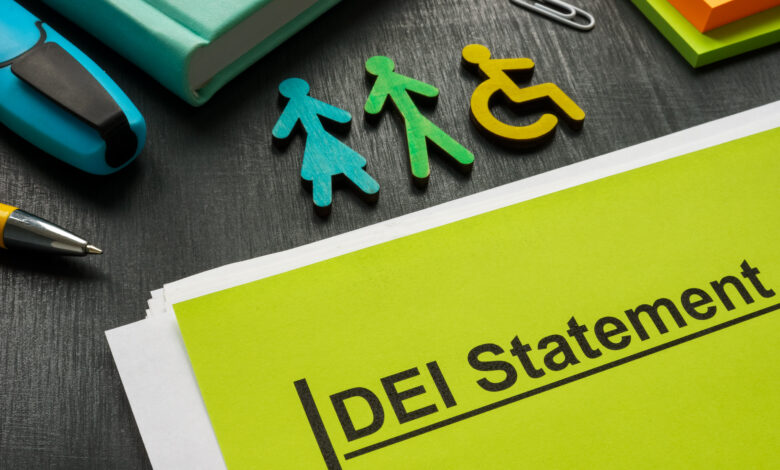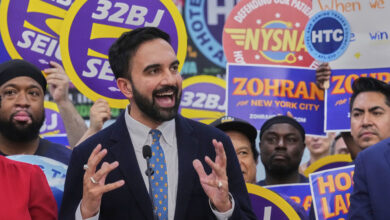DEI Statements are bad for everyone and not for meaningful change

Looking for a job in today’s politicized job market?
Prepare to submit a résumé, cover letter, references — and a Diversity, Equity, and Inclusion Statement: A page-long explanation of how you intend to bring those three seemingly benign principles into the workplace.
DEI statements have become standard practice in academia, but a tide might be turning: UNC and UMass Boston recently un-required mandatory DEI statements for student admission, employee recruitment and faculty promotion.
Here’s hoping this sets an industry precedent — a step towards reining in DEI in every sector.
When I taught at Penn State Abington from 2018-2022 as an English professor, their obsession with DEI created a hostile work environment teeming with discrimination.
Case in point: writing faculty were subjected to a video called “White Teachers are a Problem.”
After making my opposition known, I was retaliated against.
My perceived insubordination was branded on Affirmative Action Office notices, and I was sanctioned by HR as well as on my annual performance review.
Penn State’s stance was clear: Blind loyalty is required by the DEI machine.
The premier job board across academia, HigherEdJobs, shows how deeply entrenched compulsory left-think has become.
Whether you want to teach French at SUNY Oswego, Dance at Chapman, Soil Science and Nutrient Management at Colorado State, or Mechanical and Aerospace Engineering at Syracuse, your prospective employer will expect a DEI statement, so prepare to bend the knee.
Even if you aspire to become the Beef Center Assistant Manager at Washington State University: Yep: DEI statement.
And these are just a few random examples posted since Thanksgiving.
It’s an epidemic.
Make no mistake, the DEI machine has always been about toeing an ideological line — never any meaningful change.
Consider the case of Dr. Tabia Lee — a former faculty member of De Anza Community College in California.
While facilitating a “Decentering Whiteness” event featuring a BLM co-founder, Lee (who’s Black) made waves by allowing students to ask unscripted follow-up questions. For doing so, her tenure was sabotaged.
Despite being “diverse,” it turns out that Lee’s actual diversity didn’t gel with De Anza’s agenda.
A commitment to actual diversity requires respecting diverse viewpoints.
But wrong-think isn’t tolerated by the DEI Industrial Complex.
Fortunately, federal law has something to say about that: neither De Anza nor Penn State has the authority to suppress Dr. Lee or my speech, nor can they discriminate on the basis of race.
That’s why she and I — supported by the nonpartisan group, the Foundation Against Intolerance & Racism — are bringing lawsuits against our former employers.
Pull back this sacred academic curtain, and see the emperor’s new clothes for yourself.
In 2021, Pennsylvanian’s taxes and students’ tuition went towards workshops on microaggressions, intersectional feminism, anti-racism, and white privilege led by the Penn State Abington DEI grifters.
Its leader’s Juneteenth email directed white faculty and staff to “stop talking,” “find an accountability partner,” and “stop being afraid of your own internalized white supremacy.”
Such DEI efforts ooze with divisiveness, so yes, DEI statements are clearly a form of compelled speech, and thus, a violation of First Amendment free speech protections.
What’s worse, though, is the type of educational environment that DEI-ified initiatives create for students — and the culprit is the “E”: Equity.
Here’s how “equity” played out in the misguided minds of my DEI-obsessed former colleagues. A former supervisor, who endorsed the view that “reverse racism isn’t racism,” also announced that “racist structures” exist “regardless of [anybody’s] good intentions” and that “racism is in the results if the results draw a color line.”
The apparent guiding subtext here: students should be graded on the basis of race so all achieve similar outcomes.
Suppose you deflated the grades of Asian-Americans — a group that often disproportionately excels — much like Harvard deflated their acceptance rates until the Supreme Court put a stop to race-based admissions.
That’s somehow acceptable in the name of “equity?” Of course not, but disagree with enforced equity in education and in the eyes of antiracist activists, that makes you – you guessed it — a “racist.”
Alternatively, performative equity could be achieved by inflating everybody’s grades — straight A’s all around!
Harvard’s almost there: in 2020-2021, 80% of all grades were A’s, according to an October article in the Harvard Crimson.
The road to equity is paved by the soft bigotry of low expectations.
And in a world where grit, labor, and integrity win the day, academia’s obsession with “equity” breeds a “survival of the weakest” mindset.
Nevertheless, the DEI machine continues to reign supreme.
Over a five-year span, Ohio State’s DEI annual budget bloated to $20 million with nearly 200 DEI bureaucrats who cite the leftist scripture of Ibram X. Kendi and Robin DiAngelo.
But before we can enter their church, us natural-born sinners must repent by issuing performative DEI statements?
Yeah. No thanks.
Paradoxically, the more elite institutions obnoxiously virtue-signal their allegiance to DEI, the less committed they are to actual diversity and inclusion — and the more they obscure actual equality in the process.
These institutions aren’t hiding what they’re doing.
Even in the throes of my lawsuit, Penn State Abington has doubled down on DEI: there’s now a sister office — the Office of Inclusive Excellence — complete with its own cabinet-level director.
Folks: this isn’t going away unless you take action.
Here’s a start: if you’re ever asked to submit a DEI statement, don’t bend the knee to their “E” — Equity.
Reframe their game, and tell them how and why you stand up for the honorable “E”: Equality.
Zack K. DePiero (Ph.D, M.Ed) teaches writing at Northampton Community College.




